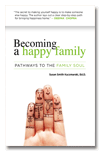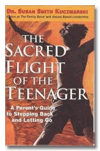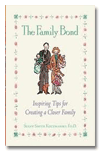Tai Chi
Copyrighted by Susan Kuczmarski
A friend on the West coast suggested that I do some reading on Taoism because my writing used some of its themes. Next thing I know, I’m hooked. Taoism is an ancient philosophy of living in balance, in harmony with nature. It’s not about trying to get something or somewhere: It’s about acceptance. Taoism teaches that wisdom lies in not contending. The secret is to allow things to take their natural course. The message for parents is clear: don’t fight against the current, flow with it. If we parents can learn to stand back, our teens will move ahead, following their own inner nature. Often, parents lead most effectively by permitting teens to be their own guides.
Taoist thought says to let negative forces pass you—and to return love. I think this is one of the most helpful strategies for parents: Meet hostility with kindness. While the oncoming force from your teen (e.g., bad words or even a punch) started out as an attempt to reach out to you, it became filtered or tainted when it passed through your teen’s personality. Your teen’s love became distorted. One must learn to look past the teen’s (or opponent’s) personality and see pure love coming towards you, maintain your center, and as hard as it may be—return love. Taoist thought says: Produce the right loving action at the right time. Timing is everything.
Tai chi is a martial art that comes out of Taoism. It expresses Taoist principles through the beautiful, flowing movements of the practitioner’s body. When I take my walks in the morning, I always see a man practicing tai chi, his body, arms and legs swaying in rhythmic harmony. The movement in tai chi is generated, not so much in the forced exertion of muscle strength as in the consciously directed flow of chi (energy). Chi circulates through the entire body and enables one to move with ease and power. With every move, the body appears to be light and agile. Grace, balance, and timing are critical in tai chi—just as they are in relating to teens.
In tai chi, force (i.e., muscle strength) doesn’t matter. To overcome the strong—one must yield. Parents can learn to yield to a teen’s oncoming force or blow—whether verbal (e.g.a nasty comment), psychic (e.g., mentally cruel treatment), or even physical (e.g., a misplaced fist)—and stay centered, retaining their dignity and equilibrium. Here’s how: Practitioners of tai chi strive to avoid something called “double-weightedness.” This is your state when your weight is evenly distributed on both feet, and movement doesn’t flow freely. To prevent it, tai chi uses the technique of stepping backward as the opponent advances, then stepping forward as the opponent retreats. This is the little sapling’s stance as it bends to accept the windy fury of the storm and survives, while the old oak, rigid and immense, is violently uprooted. Don’t be like the stationary oak, resistant and static. Rather, step back. This will help you weather the tempest as your teen storms into adulthood.
Practitioners of tai chi believe that one should bear oneself like the eagle that glides peacefully on the wind—until the instant it plunges from the sky to snatch a fish from the river far below. The eagle’s restful alertness and its capacity for swift, decisive action are traits we parents do well to emulate. Waysun Liao in T’ai Chi Classics describes it this way: “When in stillness you should be as the mountain: stable, peaceful, formidable, being yourself. When you are in motion you should move and feel like the waters of the river: roaring ceaselessly, yielding to any condition, capable of being both peaceful and powerful.” The message for parents is to stay balanced. Keep a clear, centered mind. Conserve, rather than expend, your chi (energy). Then, when you need to engage the roaring river or the striking eagle, your chi will be available to you. You have stored your strength for later use.
Keep in mind these images from tai chi. Discover the hidden power of the young sapling’s nonresistance. And, in the restful stillness of the gliding eagle or the silent mountain, conserve your power and energy for use when it is truly required. Practice the art of yielding and of peacefully storing your energy, engaging it when there is a need to respond swiftly and powerfully.
Let the lessons of Taoism and tai chi inform your parenting: Lead by letting teens follow their own nature and be their own guides; step back and allow negative force to pass by you, then return love; and conserve your energy for when you really need it.


